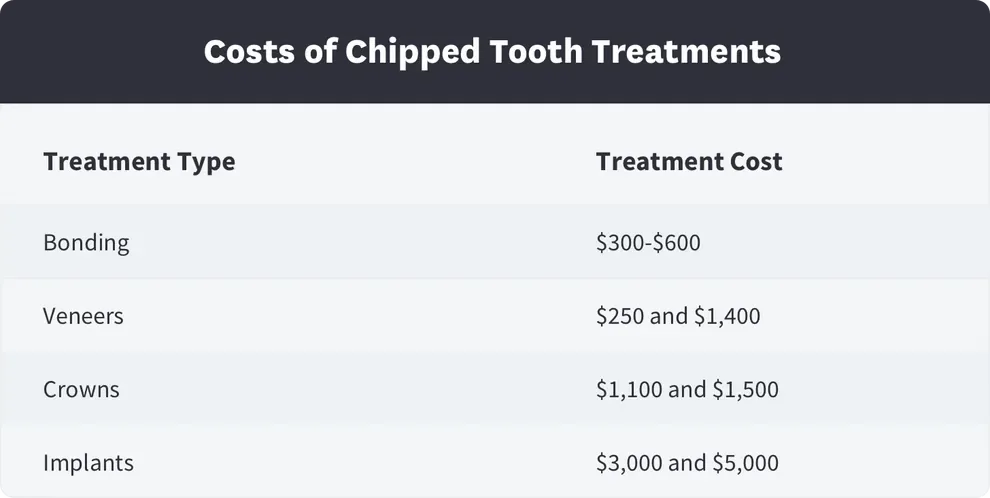How Much Does It Cost to Repair a Chipped Tooth?

Table of Contents
- Repairing a Chipped Tooth
- Can a Dentist Fix a Chipped Tooth?
- Tooth Bonding Costs
- Veneer Costs
- Crown Costs
- Dental Implant Costs
- Does Chipped Tooth Location Affect Cost?
- Chipped Tooth Repair Cost
- Insurance Coverage
- Payment Options
- Chipped Tooth Repair FAQs
- References
It can cost $300 to $5,000 to fix a chipped tooth, depending on the method used to repair the tooth. Dental bonding is the cheapest option, while an implant is the most expensive option.
There are many ways you can chip your tooth, such as trauma to the face or mouth, chewing on hard foods, or poor oral hygiene. The severity of the chipped tooth and its location will often dictate the method used to fix it. Since there are several methods for repairing a chipped tooth, each one varies in cost.
The most common methods for repairing a chipped tooth are dental bonding and veneers. More extensively chipped teeth may require a crown or even a dental implant as a last resort.
There are several different types of payment methods available. Dental insurance can help to offset the overall cost if the chip repair is medically necessary.
The extent of your chipped tooth can impact the type of treatment and repair option that is needed. In general, there are four main methods for repairing a chipped tooth:
Dental bonding
Veneers
Crowns
Dental Implants
Dental bonding is typically the least expensive, quickest, and easiest way to repair a chipped tooth, with veneers being next. Crowns are used for more extensively chipped or broken teeth when the entire top needs to be replaced. Dental implants are required when the entire tooth needs to be replaced.
Can a Dentist Fix a Chipped Tooth?
Depending on the type of repair required for your chipped tooth, you may have your chipped tooth repaired by your general dentist.
Many general dentists perform bonding, which is a common repair for a chipped tooth. Many also provide veneers and/or crowns, but some may refer patients to a cosmetic specialist for these treatments, especially in complex cases (such as multiple tooth repair or hard-to-reach teeth).
General dentists generally do not perform dental implants. Because dental implants are a more complex surgery, specialists (or even a team of specialists) may be needed. These specialists may include the following professionals:
An oral and maxillofacial surgeon (specializes in treating mouth, jaw, and face conditions)
A periodontist (specializing in gum and tooth structure)
A prosthodontist (artificial tooth specialist)
An ear, nose, and throat specialist (ENT)

Tooth Bonding Costs
Dental bonding involves putting a tooth-colored composite resin material onto the tooth and using a specialized light to set it. This typically costs between $300 and $600 on average.
The price for dental bonding is going to depend on the location of your chipped tooth, how severe it is, the extent and difficulty of the procedure, and where you have the procedure done.
Dental bonding typically lasts 3 to 10 years before it needs to be touched up. There is no real aftercare needed, but the bonding may need to be refreshed after several years.
Insurance may cover dental bonding if it is deemed to be for medical purposes and not just cosmetic reasons. The American Dental Association (ADA) reports that dental bonding is the most helpful option for repairing a chipped tooth.
Veneer Costs
Veneers use a variety of materials, usually porcelain or a composite resin, to cover up chipped or broken teeth to improve your smile. The price will depend on several factors, including these:
Type of veneer used
Location of the tooth
Difficulty of the procedure
Your geographical location
Oral health
Traditional veneers are made from a porcelain material and cost between $925 and $2,500.
Lumineers are a brand-name type of veneer that generally cost a little less, require less prep time, and use a smaller amount of material to cover the tooth. These cost between $800 and $2,000.
Composite veneers may be even cheaper. They usually cost between $250 and $1,400.
Veneers can take more than one appointment to place. They generally last 10 to 20 years, depending on the type.
Most of the time, veneers are considered to be cosmetic. As a result, they are not likely to be covered by dental insurance.
Veneers and implants are typically seen as cosmetic or elective procedures by dental insurance companies, while most other chipped tooth treatments are seen as medically necessary.
A crown can be used to repair a broken tooth with a more severe chip. It involves placing a cap over the tooth to restore its shape. Crowns can be made out of a variety of materials, which can influence the cost.
Typically, a crown will cost between $1,100 and $1,500 on average. However, crowns made out of all porcelain materials can cost quite a bit more.
Crowns are frequently covered by insurance, at a rate of up to 50 percent, as they are often classified as medically necessary.
It usually takes at least two visits to place a crown. Crowns generally last 5 to 15 years. They might need to be replaced a few times throughout your life.
Dental Implant Costs
When a chipped tooth ends up compromising most or all of the tooth, it may need to be extracted. Then, a dental implant will be placed in its space.
Dental implants are the most expensive, and generally last, option for repairing a chipped tooth. The tooth must be significantly broken to require this method.
Dental implants can cost between $3,000 and $5,000 per tooth. They require quite a bit of prep and aftercare. Many of the necessary services for placing the implant, such as x-rays, tooth extraction, and medications, are not included in this price.
Insurance may cover part of the cost, but there are often annual and lifetime maximum amounts. You will still likely be paying quite a bit out of pocket for a dental implant.
Does the Location of your Chipped Tooth Affect the Cost?
Where your chipped tooth is located in your mouth may affect how much you pay to repair it.
If your chipped tooth is in the back of your mouth, it may be harder to reach and work on. This could add time to the procedure. If you’re paying a specialist or dentist based on increments of time as part of your fee, this could increase the total amount of your bill.
Teeth in the back of your mouth may also be more likely to have damage and decay. If your cracked tooth needs treatment before or as part of the repair — such as a filling, root canal, or even extraction — this will also add to your costs.
However, repairing chips in front teeth can also be costly, as more people elect for the most natural and aesthetically pleasing repair option for these highly visible teeth. For procedures like bonding, crowns, and veneers, this means choosing the most expensive materials available, such as porcelain and ceramic.
Chipped Tooth Repair: Cost Overview
| Average cost per tooth | |
|---|---|
| Bonding | $300–$600 |
| Veneers | $250–$2,000 |
| Crown | $800–$1,500 |
| Dental implant | $3,000–$5,000 |
| Additional fees | Initial exam and x-rays can cost $500 or more without insurance; additional fees for anesthesia, prep work (such as tooth buildup), and specialist fees may also apply. |
Will Insurance Cover My Chipped Tooth Repairs?
Many dental insurance plans will cover some of the costs for repairing a chipped tooth if it’s impacting your oral health, meaning that the repair is medically necessary. However, there are limitations. Most dental plans will not cover any cosmetic procedures, even if you’re choosing these procedures to help repair the chipped tooth.
While a dental plan may cover some of the costs of bonding or even a crown, they will likely not cover any of the fees for veneers or pay the additional fees for premium materials in crowns or bonds.
Still, insurance coverage can help to lower the cost of chipped tooth repair by covering some of the procedural fees for your initial consultation with a dentist after chipping your tooth. These fees may include x-rays, exam costs, and cleanings.
Before choosing a treatment plan for your chipped tooth, talk to your insurance company to get a clear understanding of what will and won’t be covered.
Options to Pay for Chipped Tooth Repair
The first thing to look at when determining how to pay to repair a chipped tooth is your insurance policy and plan. Dental insurance can provide coverage for medically necessary procedures. If the chip repair is merely cosmetic, insurance coverage will not apply.
Dental discount plans often provide low-cost options for chipped tooth repair if you stay in-network and use specific providers. Most providers will also have financing options and payment plans that can help you find a way to budget for your chipped tooth repair.
Talk to a dental professional about which method is the most cost-effective. They can help you find the best way to repair your chipped tooth within your budget.
Chipped Tooth Repair Frequently Asked Questions
The cheapest way to repair your chipped tooth will depend on which options you have available to you. This may depend on the location of your cracked tooth and the condition of your tooth. For example, if the tooth you have cracked is already very damaged and decayed or if there’s gum damage around it, it may not be a candidate for bonding and may require treatment or even extraction.
In general, bonding — particularly when using metal material, which many find acceptable for a non-visible molar — is one of the most affordable options for chipped tooth repair, especially with dental insurance.
The length of your chipped tooth procedure will depend on the type of treatment. Often, one or more dental visits may be needed to prepare the tooth or consult about a treatment plan.
The more complex the treatment, the more time will be spent planning and preparing beforehand. A dental implant surgery, for example, may require extensive examinations and preparation as well as the involvement of specialists.
Generally, the actual procedure times for chipped tooth repair are as follows:
Bonding: This generally takes 30 to 60 minutes per tooth
Veneer: This can take 1 to 2 hours in-office hours. The entire veneer process usually takes about four weeks, with at least two dentist visits required.
Crowns: Depending on the technology used by the office, the fitting of a crown may take two visits (about 30 minutes each) or one visit lasting 60 to 90 minutes (for same-day crowns).
Dental implant: Surgery is usually completed in phases and may take months from start to finish.
Any time a tooth is chipped, it’s important to visit a dentist, so they can assess the tooth and your treatment options. Often, a chipped tooth isn’t just a cosmetic issue. It’s an oral health issue.
Depending on the health of the tooth and the depth and width of the crack, serious complications can occur if a cracked tooth isn’t fixed. These potential problems include nerve pain and damage, tooth loss, and even infection.
If your cracked tooth isn’t affecting your appearance, causing you pain, or weakening the structure of your tooth (for example, a hairline crack on an otherwise healthy back molar), it may not require treatment. However, only a dentist can safely advise you of this.
